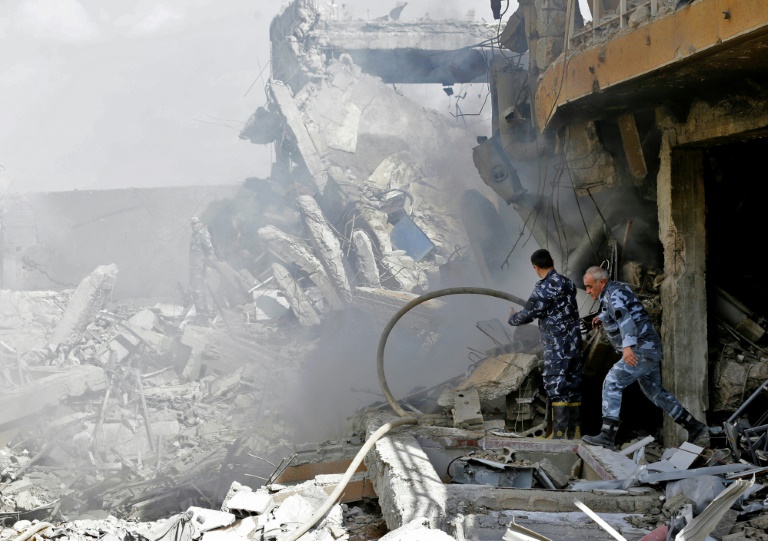
Global chemical weapons watchdog the Organization for the Prohibition of Chemical Weapons (OPCW) on Wednesday for the first time explicitly blamed Syria for toxic attacks, saying President Bashar al-Assad’s air force used the nerve gas sarin and chlorine three times in 2017.
The findings came in the first report from a new investigative team set up by the OPCW to identify the perpetrators of attacks in Syria’s ongoing nine-year-long civil war.
Western nations and rights groups condemned Syria following the release of the report, which will now go to the United Nations among others to decide what and if any further action should be taken.
In March 2017, Syrian fighter jets dropped sarin on the northern village of Lataminah and a military helicopter dropped a barrel bomb full of chlorine on the same village, the probe found.
The OPCW said the team “has concluded that there are reasonable grounds to believe that the perpetrators of the use of sarin as a chemical weapon in Lataminah in 2017… and the use of chlorine… were individuals belonging to the Syrian Arab Air Force”.
Member states of the OPCW agreed two years ago to give The Hague-based watchdog new powers to attribute blame for attacks, despite the objections of Syria and its ally Russia.
Previously, it had only been able to say whether chemical strikes had occurred but without naming the perpetrators.
‘Security threat’
The OPCW said the new Investigation and Identification Team (IIT) could not identify the precise chain of command, but that orders for the attacks must have come from senior commanders.
“Attacks of such a strategic nature would have only taken place on the basis of orders from the higher authorities of the Syrian Arab Republic military command,” IIT coordinator Santiago Onate-Laborde said.
“Even if authority can be delegated, responsibility cannot. In the end, the IIT was unable to identify any other plausible explanation,” he said in a statement.
Western nations and human rights groups praised the OPCW report, saying it proved Syria continued chemical attacks on its own population.
US Secretary of State Mike Pompeo said “no amount of disinformation from Assad’s enablers in Russia and Iran can hide the fact that the Assad regime is responsible for numerous chemical weapons attacks.”
“The unchecked use of chemical weapons by any state presents an unacceptable security threat to all states and cannot occur with impunity,” Pompeo said in a statement.
German Foreign Minister Heiko Maas agreed.
“Such a blatant violation of international law must not go unpunished,” he said.
Human Rights Watch’s UN director Louis Charbonneau said that the “OPCW’s conclusions should be used to support criminal justice for the individuals responsible.”
But OPCW head Fernando Arias pointed out that the IIT was not there to name individuals, nor did it have the power to make findings on the non-compliance of the convention on chemical weapons.
It was now up to the OPCW’s states parties, the UN Secretary-General “and the international community as a whole to take any further action they deem appropriate and necessary,” Arias said.
Fighter jets
The report said two Syrian Arab Air Force Sukhoi SU-22 jet fighters dropped two bombs containing sarin on Lataminah on March 24 and 30, 2017.
A Syrian military helicopter dropped a cylinder containing chlorine on a hospital in the same village on March 25 that year, the report said.
In total, 106 people were affected by the attacks, the OPCW said.
Almost two years ago, the OPCW confirmed that sarin and chlorine were used in two attacks on the town, but did not name those responsible at the time.
The Lataminah strikes came just days before another deadly sarin assault in nearby Khan Sheikhun on April 4 that killed more than 80 people.
Western nations launched air strikes on Syrian military targets in response to the Khan Sheikhun attack.
The OPCW team is expected to deal at a later date with an alleged 2018 chlorine attack in the Syrian town of Douma in which at least 40 people died — an investigation that has become a major bone of contention between Damascus and its Russian ally and Western nations.
Damascus has continued to deny the use of chemical weapons and insists it has handed over its weapons stockpiles under a 2013 agreement, prompted by a suspected sarin gas attack that killed 1,400 in the Damascus suburb of Ghouta.
The OPCW won the Nobel Peace Prize in 2013 for its work in Syria and says it has eliminated 97 percent of the world’s chemical weapons.
___
Image: The United States, Britain and France launched strikes against the Syrian regime in April 2018 in response to an alleged chemical weapons attack. (AFP/File/LOUAI BESHARA)




